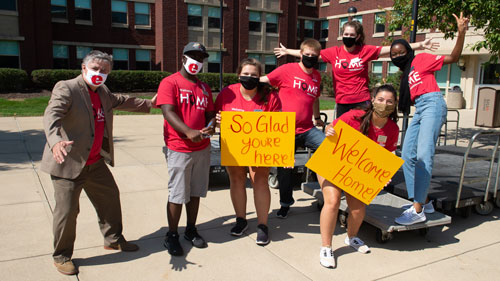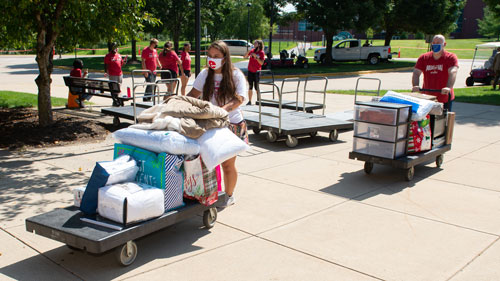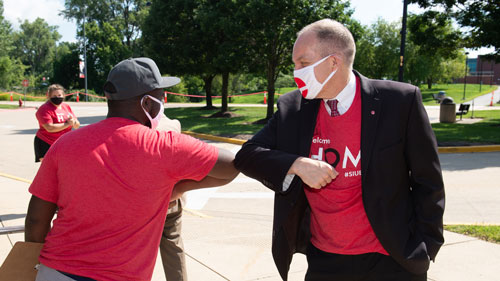Stay in touch with the latest news.
![PrincipalKafele]() This is an interesting and challenging time for educating students, but teachers and parents have no other choice than to make virtual learning work, was the motivational edict from Principal Baruti Kafele, award-winning educator and best-selling author.
This is an interesting and challenging time for educating students, but teachers and parents have no other choice than to make virtual learning work, was the motivational edict from Principal Baruti Kafele, award-winning educator and best-selling author.
The Southern Illinois University Edwardsville East St. Louis Charter High School (CHS) hosted a Zoom webinar on Wednesday, Aug. 12 featuring Kafele, who presented “Culturally Relevant Remote Strategies for Teachers and Parents.” Kafele, who calls himself “America’s Principal” and an advocate for the potential of Black and Latinx students, explained that Black students are facing two pandemics – COVID-19 and the longstanding disease of racial injustice.
“It is important to offer our parents support as we begin the school year, like we never have at any other time,” said CHS Director Gina Jeffries, EdD. “I am proud that we are able to offer this culturally relevant remote space today, and we will continue to do so in the upcoming days, as we go forward into our new school year.”
In an effort to meet the critical and pressing demands of CHS students in the midst of COVID-19 and racial unrest, Jeffries identified the need for what she has termed CRRL-Culturally Responsive Remote Learning. Students need:
- Positive student-teacher relationships
- Culturally relevant curricula
- Culturally sensitive grace (the understanding that Black/Brown students are currently fighting two pandemics)
Therefore, because of the need to offer CHS teachers and parents CRRL strategies to support remote learning, Jeffries called upon Kafele.
In helping Black students thrive while facing two pandemics, Kafele spoke to CHS teachers first. He encouraged them to look past behaviors and circumstances that may be unfavorable in a child, and gaze at the potential that may be buried inside.
“When you look into their eyes, what do you see?” asked Kafele, “It plays a critical role in who they become. Even the ones who have made multiple bad decisions.”
Kafele then displayed a photo of himself at the age of 18. “My 18-year-old self was saying, ‘I’m completely lost. I’m in my fifth year of high school with a 1.5 GPA,’” he recalled. “‘I’ve attended four different high schools. I have zero ambition. My decision-making is problematic. My self-esteem is very low and my self-confidence is virtually nonexistent.’”
“My counselor had the audacity to inform me the day before graduation, that I would never amount to anything,” Kafele continued. “He didn’t realize that 30 years later, the books that I wrote would be used by that district to train its staff. So, my 18-year-old self is saying to you teacher, ‘Don’t quit on me now, because who knows.’”
Specifically, Kafele gave CHS teachers direction on how to best teach and reach Black students, which comes from knowing their history and empowering them with knowledge of a proud and magnificent past. He offered book titles to both teachers and parents, ones Kafele said he has recently provided to white colleagues seeking to learn and understand more about Black history, culture and racial relations in the U.S., following the aftermath of George Floyd’s death.
“Parents and teachers, when we unpack Black history, we can’t start off with slavery and end with Dr. Martin Luther King Jr.,” instructed Kafele. “When we start children off with the history of themselves enslaved, then we put them at a deficit at the outset that they may never overcome. We need to go back thousands of years to African civilizations. They need to see the relationship between Black people and science, technology, mathematics, engineering, architecture, medicine, astronomy, agriculture and more.”
Book titles he recommended:
- Introduction to African Civilizations by John Jackson
- Before the Mayflower: A History of Black America by Lerone Bennett Jr.
- From Slavery to Freedom by John Hope Franklin
- Mis-Education of the Negro by Carter G. Woodson
“I can’t teach what I don’t know. Secondly, I can’t teach whom I don’t know,” Kafele intoned. “If you have a Black child in the classroom, and you don’t know that child’s history, then you don’t know that child. The educator can be Black, and the child can be Black, but if the educator doesn’t know the child’s history, thereby, he doesn’t know his own history.”
In other comments to parents, Kafele encouraged them to keep fighting for their children.
“I don’t care where your child is right now,” he said. “If your child is doing phenomenally well, your child can quadruple that. If your child has made some bad decisions and wrong turns, your child can correct that.
“The reason that I’m here as an award-winning educator with more than 150 awards over my lifetime and 11 best-selling books, is because my mother never lost hope. She kept believing there was something beneath the surface. She knew she had a gem in her son, but she had a difficult time finding out how to make it manifest.”
The principal offered “12 Critical Questions for Effective Parental Engagement.” A few of them include:
- Do I spend quality time with my child?
- Do I encourage my children to believe in themselves?
- Do I encourage my children to discover their life’s purpose?
- Do I encourage my children to develop a vision for their future?
- Do I talk to my children about respecting themselves?
Also scheduled to speak and offer strategies to CHS teachers throughout the year is Nate Williams, PhD, one of the organizers of The DREAM (Dismantling Racism through Education, Advocacy and Mobilization) Collective at SIUE.
CHS will be 100% remote learning when school starts on Monday, Aug. 17 and will be reassessed after the first quarter.
Photo:
Principal Baruti Kafele is an award-winning educator and best-selling author.
![]()


 Sweet Cravings, LLC, which provides a variety of homemade fresh quality ice cream, gourmet popcorn, and other sweets to satisfy sweet cravings, will celebrate its grand opening on Saturday, Aug. 15, at 706 Lincoln Highway in Fairview Heights.
Sweet Cravings, LLC, which provides a variety of homemade fresh quality ice cream, gourmet popcorn, and other sweets to satisfy sweet cravings, will celebrate its grand opening on Saturday, Aug. 15, at 706 Lincoln Highway in Fairview Heights. This is an interesting and challenging time for educating students, but teachers and parents have no other choice than to make virtual learning work, was the motivational edict from
This is an interesting and challenging time for educating students, but teachers and parents have no other choice than to make virtual learning work, was the motivational edict from  They are the enormous, illustrious and hugely talented shoes of the legendary Madame Katherine Dunham and the late great Theo H. Jamison, that Homer Simmons now finds himself stepping into. But Simmons is doing so with reverence, excitement and eagerness.
They are the enormous, illustrious and hugely talented shoes of the legendary Madame Katherine Dunham and the late great Theo H. Jamison, that Homer Simmons now finds himself stepping into. But Simmons is doing so with reverence, excitement and eagerness. 
 When Linda Crawford walked down the halls of Southern Illinois University Edwardsville East St. Louis Charter High School (CHS) on Monday, Aug. 17, she had a good feeling about the school. And that was before she received a Chromebook, a bookbag of classroom supplies, a box of food and school shirts for her niece, Kimbra, a CHS freshman.
When Linda Crawford walked down the halls of Southern Illinois University Edwardsville East St. Louis Charter High School (CHS) on Monday, Aug. 17, she had a good feeling about the school. And that was before she received a Chromebook, a bookbag of classroom supplies, a box of food and school shirts for her niece, Kimbra, a CHS freshman.  “First, students stop and get their schedule,” detailed Jeffries. “They receive a backpack with a CHS insignia mask, a 2020 yearbook, pens, paper, a box of food, two CHS shirts, and a Chromebook.” The shirts were made by Andrea Pagan of Kut Kreations in East St. Louis and parent of Lauren Edwards, 2020 CHS valedictorian.
“First, students stop and get their schedule,” detailed Jeffries. “They receive a backpack with a CHS insignia mask, a 2020 yearbook, pens, paper, a box of food, two CHS shirts, and a Chromebook.” The shirts were made by Andrea Pagan of Kut Kreations in East St. Louis and parent of Lauren Edwards, 2020 CHS valedictorian.  “I like doing remote work. I wasn’t upset about not coming back to school in person,” said Kimbra, who said she is prepared to go the long distance in virtual learning, if need be.
“I like doing remote work. I wasn’t upset about not coming back to school in person,” said Kimbra, who said she is prepared to go the long distance in virtual learning, if need be.  “We have a synchronous remote schedule for times when teachers and students will meet for classroom instruction,” said Jeffries. “Teachers had input in the schedule. We don’t want to overwhelm the students or the teachers.” For technology issues or concerns, contact CHS IT support associate Ronald Irving at
“We have a synchronous remote schedule for times when teachers and students will meet for classroom instruction,” said Jeffries. “Teachers had input in the schedule. We don’t want to overwhelm the students or the teachers.” For technology issues or concerns, contact CHS IT support associate Ronald Irving at 



 With everything going on right now, scrambling to learn about a new campus and its resources shouldn’t be one of them, according to Gretchen Fricke, director of Student Services in Southern Illinois University Edwardsville’s School of Education, Health and Human Behavior (SEHHB).
With everything going on right now, scrambling to learn about a new campus and its resources shouldn’t be one of them, according to Gretchen Fricke, director of Student Services in Southern Illinois University Edwardsville’s School of Education, Health and Human Behavior (SEHHB).  “We want to provide transfer students with resources to help them feel like SIUE Cougars from the very beginning,” continued Fricke. “Every campus is a little different. We want our new students to know what campus resources are available in their academic journey and in their extra-curricular pursuits. We also want students to realize that our advising team is here to help them with this transition.”
“We want to provide transfer students with resources to help them feel like SIUE Cougars from the very beginning,” continued Fricke. “Every campus is a little different. We want our new students to know what campus resources are available in their academic journey and in their extra-curricular pursuits. We also want students to realize that our advising team is here to help them with this transition.”  Southern Illinois University Edwardsville experienced a 2% increase in 2020 summer enrollment over 2019 and reached its highest level since 2017 with 6,165 total students. As a result of the enrollment surge, credit hours taken increased 3.5%, and full-time equivalency enrollment was up 7%.
Southern Illinois University Edwardsville experienced a 2% increase in 2020 summer enrollment over 2019 and reached its highest level since 2017 with 6,165 total students. As a result of the enrollment surge, credit hours taken increased 3.5%, and full-time equivalency enrollment was up 7%. As local school districts adjust schedules and suspend certain instructional areas due to challenges surrounding the COVID-19 pandemic, the Southern Illinois University Edwardsville Suzuki Strings Program is ensuring developing string musicians can pursue their training and fulfill their love for music by offering a new String Bridge program.
As local school districts adjust schedules and suspend certain instructional areas due to challenges surrounding the COVID-19 pandemic, the Southern Illinois University Edwardsville Suzuki Strings Program is ensuring developing string musicians can pursue their training and fulfill their love for music by offering a new String Bridge program.

 The Southern Illinois University Edwardsville School of Pharmacy Student National Pharmaceutical Association (SNPhA) is once again collaborating with the Saint Louis University School of Medicine to offer free healthcare and education to Chinese speaking patients.
The Southern Illinois University Edwardsville School of Pharmacy Student National Pharmaceutical Association (SNPhA) is once again collaborating with the Saint Louis University School of Medicine to offer free healthcare and education to Chinese speaking patients.  “SIUE pharmacy students help in gathering patients’ home medication list and translate or find drug information if the medications are from China. They also perform blood pressure screenings along with the medical students. The medical and pharmacy students work together to develop assessments and plans for the patient.”
“SIUE pharmacy students help in gathering patients’ home medication list and translate or find drug information if the medications are from China. They also perform blood pressure screenings along with the medical students. The medical and pharmacy students work together to develop assessments and plans for the patient.”  Southern Illinois University Edwardsville sophomore Bryan Robinson has envisioned himself appearing in a feature role on the television series, “24,” where he’s working under duress to help save the world from an impending enemy, using only his technology skills to do it!
Southern Illinois University Edwardsville sophomore Bryan Robinson has envisioned himself appearing in a feature role on the television series, “24,” where he’s working under duress to help save the world from an impending enemy, using only his technology skills to do it!
 Former Southern Illinois University President Glenn Poshard, PhD, and his wife, Jo, have donated $100,000 to establish the Glenn and Jo Poshard Scholarship Endowment for the SIUE School of Education, Health and Human Behavior (SEHHB).
Former Southern Illinois University President Glenn Poshard, PhD, and his wife, Jo, have donated $100,000 to establish the Glenn and Jo Poshard Scholarship Endowment for the SIUE School of Education, Health and Human Behavior (SEHHB).  A dozen Southwestern Illinois-based entrepreneurs and their innovative business concepts have been selected to move into the second round of the 7th annual Southern Illinois University Edwardsville Small Business Development Center (SBDC) Metro East Start-Up Challenge (MESC) business plan competition.
A dozen Southwestern Illinois-based entrepreneurs and their innovative business concepts have been selected to move into the second round of the 7th annual Southern Illinois University Edwardsville Small Business Development Center (SBDC) Metro East Start-Up Challenge (MESC) business plan competition. “We hold these truths to be self-evident: that all men and women are created equal; that they are endowed by their Creator with certain inalienable rights; that among these are life, liberty, and the pursuit of happiness,” was penned in “The Declaration of Rights and Sentiments” and signed in 1848 at the first Women’s Rights Convention held in Seneca Falls, N.Y., organized to amplify the need for women’s suffrage. The fight to win the vote for American women finally produced the Nineteenth Amendment to the Constitution, which was ratified on Aug. 18, 1920 and officially signed on Aug. 26, 1920.
“We hold these truths to be self-evident: that all men and women are created equal; that they are endowed by their Creator with certain inalienable rights; that among these are life, liberty, and the pursuit of happiness,” was penned in “The Declaration of Rights and Sentiments” and signed in 1848 at the first Women’s Rights Convention held in Seneca Falls, N.Y., organized to amplify the need for women’s suffrage. The fight to win the vote for American women finally produced the Nineteenth Amendment to the Constitution, which was ratified on Aug. 18, 1920 and officially signed on Aug. 26, 1920.  “The Women’s Studies program aims to educate about women’s societal contributions” said Rocha. “Those contributions are often the untold stories of women of different classes, races, and ethnicities, and issues of uneven power as a result of gender, sex and sexuality. Thus, this anniversary constitutes a wonderful opportunity for students to learn about the arduous process of women’s enfranchisement in the United States, a process that brought together several generations of women from all walks of life.”
“The Women’s Studies program aims to educate about women’s societal contributions” said Rocha. “Those contributions are often the untold stories of women of different classes, races, and ethnicities, and issues of uneven power as a result of gender, sex and sexuality. Thus, this anniversary constitutes a wonderful opportunity for students to learn about the arduous process of women’s enfranchisement in the United States, a process that brought together several generations of women from all walks of life.” 








